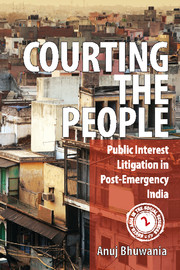Book contents
- Frontmatter
- Contents
- Acknowledgements
- Introduction
- 1 Competing Populisms: Revisiting the Origins of Public Interest Litigation in India
- 2 The Case that Felled a City: A PIL with Nine Lives
- 3 Public Interest Litigation as a Slum Demolition Machine
- 4 Good Judges, Bad Judges: Critical Discourses on Public Interest Litigation in India
- Conclusion: The Procedural is Political
- Bibliography
- Index
Introduction
Published online by Cambridge University Press: 23 July 2017
- Frontmatter
- Contents
- Acknowledgements
- Introduction
- 1 Competing Populisms: Revisiting the Origins of Public Interest Litigation in India
- 2 The Case that Felled a City: A PIL with Nine Lives
- 3 Public Interest Litigation as a Slum Demolition Machine
- 4 Good Judges, Bad Judges: Critical Discourses on Public Interest Litigation in India
- Conclusion: The Procedural is Political
- Bibliography
- Index
Summary
In recent years, ‘PIL’ has made an appearance in many a Hindi film. Two examples come to mind. In the somewhat ungrammatically titled Sahib, Biwi aur Gangster Returns, the mention of PIL comes when a state legislator – the eponymous Biwi, whose official position has come to her by dint of being married to a small-time prince in the North Indian state of Uttar Pradesh – decides to take some interest in what's going on in her constituency. The first important piece of information her office assistant provides her with is that a PIL has been filed against land acquisition for a development project in her area. Her baffled response is, ‘Yeh PIL kya hota hai?’ (‘What is PIL?’) She is clearly ill-informed. But that the film chooses to invoke PIL to show her complete political cluelessness, and that the astounding nature of this fact will be immediately apparent to the audience watching popular cinema, the lowest common denominator in India if there is one, gives us some clue perhaps to the omnipresence of PIL in contemporary Indian life. The second film, a satirical comedy called Jolly LLB, is much more directly concerned with the operation of the judiciary. It centres around a small-town lawyer who is trying to make it big in Delhi's law courts and decides that filing a PIL might be the quickest way to get media attention. In a scene that made it into the film's promotional trailer, a judge is shown angrily throwing away Jolly's legal brief, saying, ‘What kind of PIL have you filed? You have spelt Prosecution as Prostitution and appeal as apple!’ Clearly, PIL is one kind of legal process everybody understands. As much as ‘appeal’ and ‘prosecution’, it has entered the Indian demotic lexicon.
So widespread is its reach that PIL has become a sort of metonym for the greatness of the Indian judiciary. No area of Indian law has been written about as extensively (and almost entirely hagiographically) as PIL. There are more American law review articles on PIL than on any other area of Indian law. Indeed, Indian judges routinely cite these approving articles to hail their own achievements. PIL has by now been successfully transplanted in other neighbouring South Asian countries as well. PIL is celebrated by all and sundry as India's unique contribution to contemporary jurisprudence.
- Type
- Chapter
- Information
- Courting the PeoplePublic Interest Litigation in Post-Emergency India, pp. 1 - 15Publisher: Cambridge University PressPrint publication year: 2016



